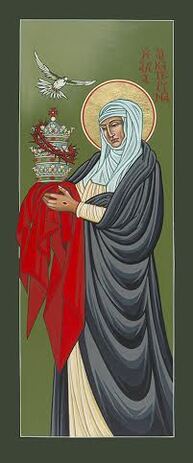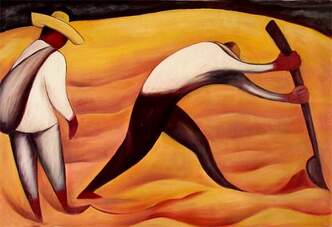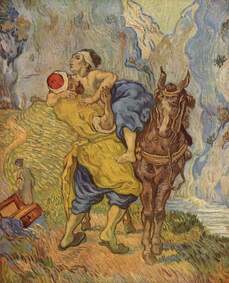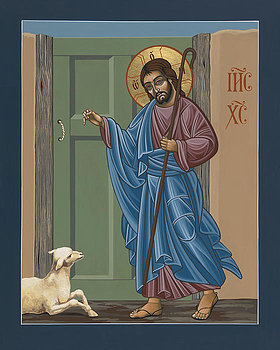 While recently reading a book about St. Catherine of Siena, (1347-1380), I was struck by the practicality of some of her insights. In reference to our relationship with God she said, “Open the door to your heart, for it is really rude to let God stand at the door of your soul without opening to Him.” Leaving anyone standing at a closed door is rather discourteous, especially when it is God! St. Catherine is indicating that when we deny God entrance, we cannot grow in relationship with Him; but she is further implying that to keep Him outside is a sin against ourselves because we are also refusing His mercy and the opportunity to let ourselves be healed. The truth is that none of us deserve forgiveness, but in His great love and mercy God offers it anyhow. The whole of our faith revolves upon this reality: we are all loved sinners for whom Jesus the Lord died and rose in order to offer us something we could never deserve or earn. He simply offers the gift because He is mercy and He is Love. And in this, He wants us to learn to offer the same love and mercy to others for the good of everyone in our communities, churches, and world. In other words, it is how we evangelize and thus contribute to building the Kingdom.  A stumbling block to forgiveness is that sometimes we think forgiving means forgetting. To try to forgive is good, but to try to forget is to do ourselves violence. Besides, it is almost impossible to do anyway. In fact, if we were to forget we would learn nothing from the experience. Forgiveness is a process in which we must honestly access what the offense against us has been, the state of our relationship with the other, and what it will take for healing to occur. To forgive means we have to risk setting the other person free whether we think they deserve it or not. It means we offer the mercy and let God offer the judgment. And let us be clear, judgment and justice is not the same thing, though one flows from the other. Judgment is about deciding who deserves what, and only God can accurately do that, though He offers us the ability to discern and make informed decisions based on grace, common sense, and His teaching. Justice is what is done to atone, the action taken to right a wrong, to learn from an event or situation, and finally to heal. Offering mercy does not mean that we eliminate justice; remember, justice without mercy is cruelty and mercy without justice becomes an ‘anything goes’ mentality in which chaos will reign. Justice must be based on love so that we can move forward together. Without love and mercy, (which indicate that we have indeed forgiven), justice cannot take place.  In the gospels Jesus healed and forgave many people, but the healing of the paralytic stands out. (Matthew 9:1-8) When Jesus approached the paralytic, He first told him that his sins were forgiven, and then later He stated that the man was healed of his bodily infirmity. Only after Jesus indicated that healing the man’s soul was more important than healing the body, was the man able to get up and walk. Newly healed, the man could now do what was needed: picking up his mat, he got to work. This shows that God’s justice and mercy were affecting change within this man. Jesus offered him healing, but the man needed to get up and work at building a better life. That is, he needed to go out and offer to others the same mercy he had received.  It is important to truly desire to forgive, but if we are honest, we need to beg for the grace so that we can mean it with sincerity. That is, we need to allow ourselves time to grieve the pain and hurt, and with the help of grace, to let go of what holds the other and ourselves bound. We must acknowledge that we are all sinners, and then be sorry for our part in sin. Only when we have humility can we begin to see that the other is as weak and prone to sin as we are. As long as we think we are somehow better than the other, forgiveness (true mercy and justice) is not really possible. We have to own that we are just as capable of the sin as the other had been. In other words, we cannot forget redemption. If we keep people stuck in their past mistakes by judging them based on it, we will never reconcile. And if we fail to forgive, we relegate everyone to the status of Judas, forgetting that even he was offered redemption. The problem for him was that he refused it, unlike Peter, whose sin was also a betrayal, but who did accept redemption because he allowed himself to be humbled, to trust in the promise of Jesus’ mercy, and committed himself to work for God’s people, that is, to build the Kingdom of God where true Justice and Mercy reign. So let us continue to work on our own issues of sinfulness and to reach out to others so that we can let true justice, equality, mercy, and love grow in our communities, churches, and world. Let us not be rude to God: let us open the door to our hearts and let Him in.  May we ask for the intercession of St. Catherine that we might learn to recognize the Lord standing at the door of our heart so we can open it! May we accept the gift of humility that we may offer mercy to others and work toward justice together! And may we ask for the graces needed to forgive those who have wronged us so we can move forward in love! Let us meet in the Heart of Jesus! Peace! ©Michele L. Catanese Note: God’s justice and mercy have always been consistent. If we read the passages in the Old Testament in which God was angry with His people due to their massive sins, He always rescued them when they cried out in true sorrow, having learned a lesson. But then there was always atonement; they did not simply walk away, but had to work through the consequences of what they had done. That is, justice was meted out. The atonement was not a payback demanded by God; rather, the consequences of their sin helped them to learn from their mistakes. In the end, the atonement brought healing and freedom through the knowledge they gained along the way….until the next generation came along and the process began all over again. Images: 1. Icon, St. Catherine of Siena - Guardian of the Papacy, by Fr. William Hart McNichols. You can obtain a copy of this icon at https://fineartamerica.com/featured/st-catherine-of-siena-guardian-of-the-papacy-288-william-hart-mcnichols.html 2. My photo, a river on the North Island in New Zealand. This symbolically captures the flowing of justice and mercy as coming from the same source, God. 3. Painting, Peasants by Diego Rivera. 4 Painting, The Good Samaritan, Vincent van Gogh. 5. Icon, El Buen Pastor, by Fr. William Hart McNichols. You can obtain a copy of this icon at https://fineartamerica.com/featured/el-buen-pastor-188-william-hart-mcnichols.html NOTE: In compliance with GDPR rules, I wish to make it clear that I do not gather any information on any of my readers at any time.
elise campana
7/13/2020 12:10:12 pm
I've learned that at times only God's grace can heal and move me 7/13/2020 01:05:29 pm
Yes, of course! Thank you for sharing your insight and experience, Elise.
Myriam Balzola
7/15/2020 07:48:03 pm
Thanks so much Michele! I enjoy your blogs they are invigorating! This one on forgiveness is exceptional! Everyone needs to practice this. Stay safe we are doing good in Florida keeping the distance. Comments are closed.
|
Heart Speaks to Heart
|

 RSS Feed
RSS Feed

